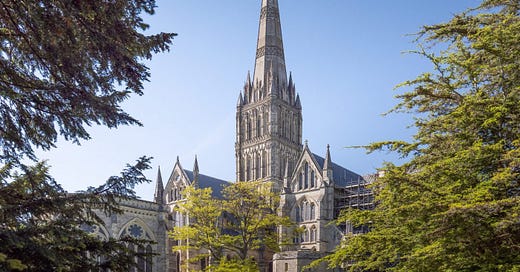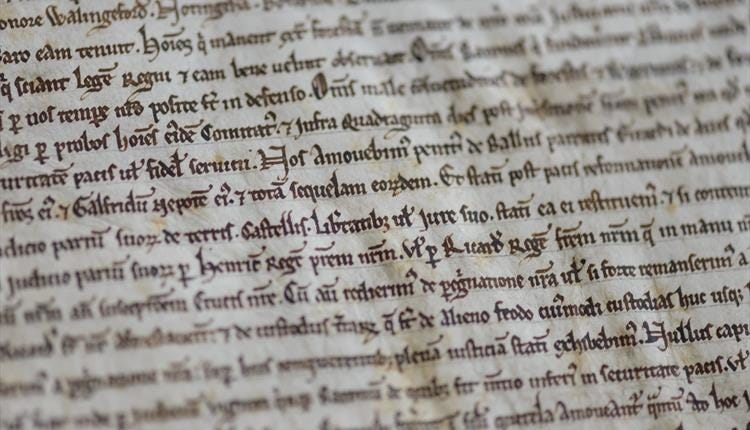Magna Carta And The Making Of The English
Review: The New Culture Forum Locals South West Region Conference 'Magna Carta And The Making Of The English, held on 29/3/25
Under piercing sunshine and a clear blue sky, Salisbury Cathedral stands in glory. I slowly tread under its marvellous 404 foot spire and think about the skill and determination of the those who bequeathed this stupendous sight to posterity. The main body of the building was complete by 1258, thirty-eight years after construction started. For a cathedral, this was relatively quick timing. The spire was not finished until 1330. Thankful for this peaceful morning, I am able to take in my surroundings. This place is so beautiful, but I wonder for how long this will be. The disfiguring of England continues with such alarming speed.
During her speech at the New Culture Forum Locals South West Region Conference inside the Medieval Hall, Salisbury, Emma Webb said that Salisbury is ‘‘so beautiful that it is heartbreaking’’ in the context of having come to the event from London. Her words were resonant.
Webb spoke about the enduring presence of Magna Carta in the English national conscience. The charter is often invoked whenever a sense of decency and fairness is trespassed on. The owner of Wetherspoons, Tim Martin, referred to Brexit as the new Magna Carta. When lockdown ensued in 2020, a hair salon invoked the document in an attempt to overcome the prohibition on opening businesses. Magna Carta might be ‘‘legally obsolete, but is it irrelevant?” She asserted that the charter is far from irrelevant and tied to our ‘‘immemorial constitution”. Webb offered the poignant example of her grandmother being deprived of a hug with her family when she was at a care home during the coronavirus restrictions. Her grandmother was told by a nurse that a hug was illegal, and she replied that the government cannot make such a rule because that is illegal. As with the earlier examples, Webb’s grandmother was invoking something higher than the edicts of the current day. Webb was right to point out how the constitution is almost as organic as the English people who have carried it through the ages. Webb briefly compared the way the charter endures over generations in our national memory and the inheritance of our genes. A society that upholds healthy traditions allows a seamless adoption of ideas important to a people; this is not dissimilar to traits moving from parent to child.
Webb’s speech included references to Burke and more on our constitutional inheritance. It was strong, but there is room for some constructive criticism. With the current troubles in mind, she made a passing reference to things not being an issue if there were an “integration” of incomers. Although this comment was fleeting, the notion must be opposed. When numbers of incomers continue to rise, the particularity and uniqueness of a given place and the right of a native population to shape their environment as they see fit erodes. A well-ordered society can absorb some differences without harming the native interest, but we are beyond that stage. Some might feel that this point is over-critical, as Webb’s reference to integration was brief; however, integration must be disregarded as something that addresses our fundamental interests.
“Courage” is the most “necessary virtue”
In a captivating talk, historian Dr David Starkey argued that the Magna Carta became conservative. He said Britain’s history would have been disastrous if the charter issued in 1215 had retained agency in its original form. King John’s tyranny was turned against him by a document characterised by the self interest of the committee of twenty-five barons. Starkey highlighted the radicalism of the charter. Everyone in England had to renounce their oath to the king and swear an oath to the twenty-five. If the king refused a judgement of the twenty-five, the people had to join with the barons and pursue the king to the point of sparing his life. The historian said: “This is genuinely revolution”. The 1215 charter was very quickly declared illegal by Pope Innocent III. It survived from June until the autumn.
The Magna Carta founded the right to trial by jury in England. Starkey argued the charter played a role in ensuring a less severe legal climate than elsewhere in Europe. He made particular reference to torture, which English lawyers denounced in the fifteenth century.
John fought back and won the battle at Rochester in 1215. The barons sought support from Prince Louis of France and surrendered England to him on terms. They did not insist he subscribe to the charter. Starkey noted the marked difference between this and the situation in 1689 where politicians sought the commitment of William and Mary to the Bill of Rights. Louis’s intervention was disastrous for John. When John died, William Marshal became regent for the young Henry III.
At the point of Marshal’s introduction into the story, Starkey came to the subject of courage and its place as ‘‘the most necessary virtue’’ in our current predicament; this is something the jouster Marshal had in abundance, fighting in battle well into his old age.
The Royals decided to reissue the charter in 1216. Starkey describes this as the ‘‘fundamental document” preserving all the good clauses. Through the machinery of the twenty-five, the barons had set up an anti-royal government with no mention of the sovereign in writs. Despite the new charter, the civil war continued. At the age of seventy, Marshal personally cut down his cousin. He is known for his crucial role in winning the First Barons' War, ensuring the succession of Henry III and the survival of Magna Carta. When describing this fighting Starkey said: ‘‘We are going to have to rediscover this.”
Henry III reissued the charter in 1225 with his seal. The barons were witnesses to a document given freely. The Magna Carta ‘‘becomes mythic’’ and ‘‘becomes a conservative document’’ at a further reissuing in 1253.
After his riveting recollection, Starkey said Blairite governance, imposed since 1997, has “destroyed the constitution as deduced from Magna Carta”. He reiterated his call for a restoration that would repeal the institutional changes made by Tony Blair.
Starkey finds human rights doctrine to be undemocratic. He said these dictates privilege minorities over the majority. He reasons there is no universal man, so there can be no universal human rights.
It was fitting that a conference referred to as a celebration of English culture should end with a speech about English achievements. Rafe Heydel-Mankoo delivered an engaging talk.
The origins of British contributions to the world are very often English.
The Industrial Revolution was the greatest leap forward since the development of agriculture in the Neolithic period 12,000 years earlier. He credits this event with a consistent increase in standards of living and the emergence of food and labour surpluses.
Heydel-Mankoo described the English role in the British Empire, citing the diffusion of the rule of law, due process, the rights of the individual, and stable political frameworks. He noted the achievements of the English in medicine, hospital building, railway construction and the concomitant connectivity of people hitherto separated by distance, improved diet via transportation of perishables, the lowering of travel costs, road making, urbanisation, sewage systems and the establishment of police forces and civil services.
He avowed: ‘‘Nothing has done more to lift the world out of poverty than capitalism.’’ England was not the first country to embrace capitalism, but modern industrial capitalism is an English invention.
The abolition of abhorrent practices is a significant feature of the British imperial legacy. Suttee, infanticide and the abolition of slavery are examples. The latter was vehemently opposed by many Africans, some of whom remain committed to slavery today.
The historian noted the Reformation, the increase in literacy that followed, individualism and the Protestant work ethic as having a positive impact.
The invention and codification of sports represent some of England’s finest gifts to the world. Football, cricket and boxing are three examples.
Heydel-Mankoo argued that along with Italy, England has had the greatest impact of any nation.
The event featured fine contributions from Professor Lawrence Goldman: ‘‘2015-2025: Commemorating Magna Carta in Bejing and Reclaiming History in Britain”, and Professor Robert Adam: ‘‘Tradition and Identity Where We Live.” Look out for all speeches from the event on YouTube.
All subscriptions, likes and shares are very much appreciated.
References
https://www.newcultureforum.org.uk/
https://www.salisburycathedral.org.uk/
https://www.parliament.uk/magnacarta/
Click here for details about NCF locals.






